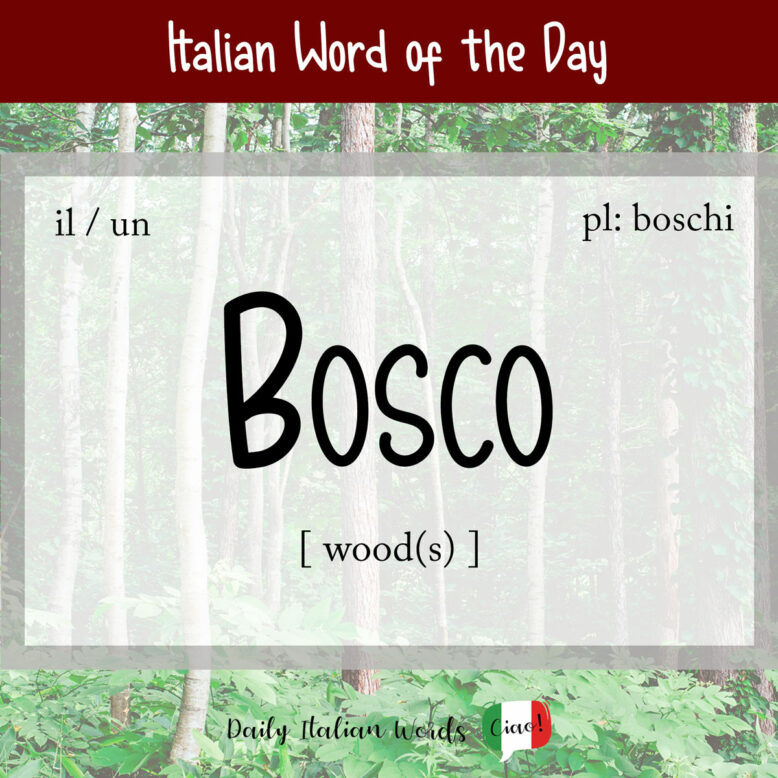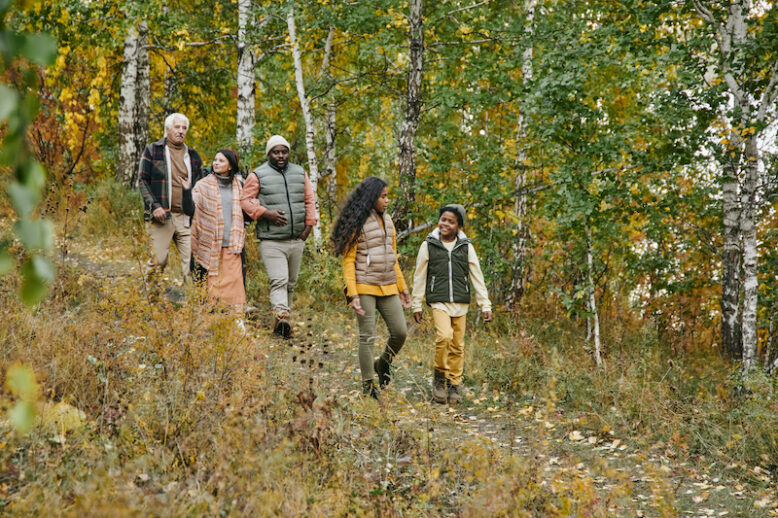On the weekend, one of our favourite pass-times as a family is going on a walk in the woods. In Italian, woods translates to bosco.
bosco
wood(s) / woodland

Bosco is a masculine noun, derived from the West Germanic busk or bosk, with its plural form being boschi. Here are its definite and indefinite articles:
- il bosco = the wood(s)
- i boschi = the woods / woodlands
- un bosco = a wood / woodland
- dei boschi = some woods
You will have noticed that in English, we can use either the singular wood or the plural woods to indicate a small area of land covered in trees. In Italian, bosco is always singular when referring to one specific woodland area. The plural boschi, on the other hand, is used to refer to multiple woodlands.
Andiamo a fare una passeggiata nel bosco.
Let’s go for a walk in the woods.
Ci sono tanti boschi in Canada.
There are many woodlands in Canada.

Here are some different kinds of boschi you might encounter:
- bosco resinoso = resinous woods
- bosco di betulle = birch woods
- bosco da legname = timber woods
- bosco ceduo = coppice
- bosco di querce = oak woods
- bosco di abeti = fir woods
- bosco di pini = pine woods
Frutti di bosco (literally “fruits of the woods”) is the term for mixed berries, which include popular choices like lamponi (raspberries), fragole (strawberries), mirtilli (blueberries), more (blackberries), and so on.

Uccel di bosco, in addition to referring to a bird that resides in the woods, is also a figurative term for someone who is free to come and go as he pleases. It appears in a few idiomatic expressions including:
- Essere / rendersi uccel di bosco (literally “to be / make oneself a woodland bird”) > to be a fugitive, on the run
- È meglio essere uccel di bosco che uccel di gabbia (literally “it is better to be a woodland bird than a caged bird”) > it’s better to be free than in a cage
Figuratively speaking, bosco can also denote something with a tangled appearance. For example, a person who hasn’t brushed their hair in the morning could be described using the expression un bosco di capelli incolti (literally “a woodland of wild hair”).

To conclude this article, let’s take a quick look at some useful terminology related to bosco in Italian:
- boscosità = woodiness
- boschivo = woodland / tree-covered
- boscoso = wooded / woody / tree-filled
- boscaiolo = woodsman / lumberjack / forest ranger
- boschetto = thicket / grove / brush / copse
- boschereccio = woody
- boscaglia = scrub / undergrowth
La Pecora nel Bosco
One of my son’s favourite songs is called La Pecora nel Bosco, which translates to The Sheep in the Woods. Here is the version produced by Coccole Sonore.
La pecora è nel bosco, bum!
La pecora è nel bosco, bum!
La pecora è nel bosco, lerillerillelera
La pecora è nel bosco, lerillerillelerà
Vogliam vedere il bosco, bum!
Vogliam vedere il bosco, bum!
Vogliam vedere il bosco, lerillerillelera
Vogliam vedere il bosco, lerillerillelerà
Il fuoco l’ha bruciato, bum!
Il fuoco l’ha bruciato, bum!
Il fuoco l’ha bruciato, lerillerillelera
Il fuoco l’ha bruciato, lerillerillelerà
Vogliam vedere il fuoco, bum!
Vogliam vedere il fuoco, bum!
Vogliam vedere il fuoco, lerillerillelera
Vogliam vedere il fuoco, lerillerillelerà
L’acqua l’ha spento, bum!
L’acqua l’ha spento, bum!
L’acqua l’ha spento, lerillerillelera
L’acqua l’ha spento, lerillerillelerà
Vogliam vedere l’acqua, bum!
Vogliam vedere l’acqua, bum!
Vogliam vedere l’acqua, lerillerillelera
Vogliam vedere l’acqua, lerillerillelerà
Il bue l’ha bevuta, bum!
Il bue l’ha bevuta, bum!
Il bue l’ha bevuta, lerillerillelera
Il bue l’ha bevuta, lerillerillelerà
Vogliam vedere il bue, bum!
Vogliam vedere il bue, bum!
Vogliam vedere il bue, lerillerillelera
Vogliam vedere il bue, lerillerillelerà
Il bue è fuggito, bum!
Il bue è fuggito, bum!
Il bue è fuggito, lerillerillelera
Il bue è fuggito, lerillerillelerà
The sheep in the woods, bum!
The sheep in the woods, bum!
The sheep in the woods, lerillerillelera
The sheep in the woods, lerillerillelerà
We want to see the woods, bum!
We want to see the woods, bum!
We want to see the woods, lerillerillelera
We want to see the woods, lerillerillelerà
The fire burned them, bum!
The fire burned them, bum!
The fire burned them, lerillerillelera
The fire burned them, lerillerillelerà
We want to see the fire, bum!
We want to see the fire, bum!
We want to see the fire, lerillerillelera
We want to see the fire, lerillerillelerà
The water put it out, bum!
The water put it out, bum!
The water put it out, lerillerillelera
The water put it out, lerillerillelerà
We want to see the water, bum!
We want to see the water, bum!
We want to see the water, lerillerillelera
We want to see the water, lerillerillelerà
The ox drank it, bum!
The ox drank it, bum!
The ox drank it, lerillerillelera
The ox drank it, lerillerillelerà
We want to see the ox, bum!
We want to see the ox, bum!
We want to see the ox, lerillerillelera
We want to see the ox, lerillerillelerà
The ox ran away, bum!
The ox ran away, bum!
The ox ran away, lerillerillelera
The ox ran away, lerillerillelerà
Heather Broster is a graduate with honours in linguistics from the University of Western Ontario. She is an aspiring polyglot, proficient in English and Italian, as well as Japanese, Welsh, and French to varying degrees of fluency. Originally from Toronto, Heather has resided in various countries, notably Italy for a period of six years. Her primary focus lies in the fields of language acquisition, education, and bilingual instruction.


